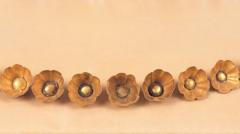The Sudan National Museum, once a beacon of the country's historical identity, now lies in ruins as the two-year conflict ravaging Sudan has taken a severe toll on its cultural heritage. Emblazoned with artifacts from ancient Nubian civilizations and Christian wall paintings, the museum was a hub for educational tours and cultural events before the onset of violence. Now, following intense fighting between the Sudanese military and the Rapid Support Forces (RSF), it has become a grim reminder of the war's brutality.
Government officials report that the RSF, during its control over central Khartoum, systematically looted the museum, where an estimated tens of thousands of valuable pieces were either destroyed or illegally exported for profit. “They destroyed our identity, and our history,” lamented Ikhlas Abdel Latif Ahmed, the director of museums at the National Corporation for Antiquities and Museums. The profound loss of such cultural artifacts echoes the broader suffering experienced by the population, with the UN estimating nearly 13 million displaced and a death toll exceeding 150,000.
Upon a recent visit to assess the damage at the museum, Ahmed found shattered glass, bullet casings, and clear evidence of looting where vibrant history once resided. The museum, positioned strategically in Khartoum near vital landmarks, was in the middle of renovations, rendering many priceless items vulnerable to theft. Although Sudanese officials suspect that looted gold artifacts, including a historic collar from the pyramid of King Talakhamani, may have been smuggled to the United Arab Emirates, evidence remains scarce.
In light of these events, there are calls for international assistance from Interpol and UNESCO to locate and recover lost artifacts, yet the prospects are dim. The RSF, under criticism for its actions, denies any claims of deliberately targeting Sudan's cultural assets, while observers consider these actions a calculated effort to erase Sudanese identity and heritage. Amgad Farid, a critic from the Fikra for Studies and Development think-tank, noted that this assault on heritage is less about criminality and more about obliterating Sudan’s historical legacy.
Meanwhile, the humanitarian toll of the conflict lingers painfully as Sudan's citizens grapple not only with the physical destruction of their homes and cultural sites but also with the emotional scars of history lost. Despite the challenges, Ahmed and her colleagues remain hopeful, vowing to restore the museum and recover its collections, believing that in doing so, they will rebuild not just a museum but a vital link to their nation's soul. “Inshallah, we will get all our collections back,” Ahmed stated resolutely, hoping for a future where Sudan's history is preserved and honored once again.
















